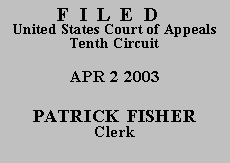

| LORICE T. WALLACE; LISA F.
WALLACE,
and STEPHEN PAUL WALLACE, Plaintiff - Appellant
Defendants,
TERRY BARKER, individually, and
ROBERT LAWRENCE, individually,
Defendants- Appellees |
|
Although we have stated that "[r]egardless of how it is styled, a post-judgment motion filed within ten days of entry of judgment that questions the correctness of a judgment is properly construed as a Rule 59(e) motion," Venable v. Haislip, 721 F.2d 297, 299 (10th Cir. 1983), the current appellate rules envision that a Rule 60 motion may be filed within ten days after entry of judgment. Fed. R. App. P. 4(a)(4)(A)(vi). Our review of the district court's denial of the Rule 60(b)(3) motion is for an abuse of discretion. Looking at the motion before the district court, Mr. Wallace argued the merits of his case in general terms, stating in the last sentence that he never received a copy of "Defendants Response." Aplt. Br. attach., first Ex. 8. Given a certificate of service on the summary judgment motion, Doc. 174 at 12-13, and the district court's repeated warnings that Plaintiffs must respond to motions, it is clear that Mr. Wallace was required to do more to substantiate his Rule 60(b)(3) motion, as fraud by one's adversary in the course of litigation must be proven by clear and convincing evidence. See Anderson v. Department of Health & Human Servs., 907 F.2d 936, 952 (10th Cir. 1990). The district court did not abuse its discretion on these facts.
AFFIRMED.
Entered for the Court
Paul J. Kelly, Jr.
Circuit Judge
*. This order and judgment is not binding precedent, except under the doctrines of law of the case, res judicata, and collateral estoppel. This court generally disfavors the citation of orders and judgments; nevertheless, an order and judgment may be cited under the terms and conditions of 10th Cir. R. 36.3.
1. After examining the briefs and the appellate record, this three-judge panel has determined unanimously that oral argument would not be of material assistance in the determination of this appeal. See Fed. R. App. P. 34(a); 10th Cir. R. 34.1(G). The cause is therefore ordered submitted without oral argument.